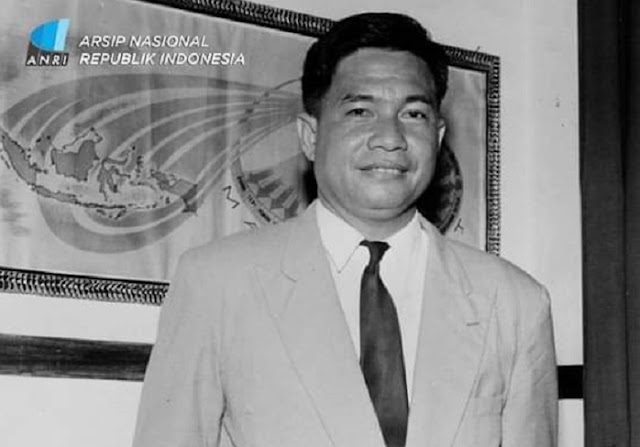
The government honored his profile with the title of national hero in 1998-about 11 years after he passed away.
His mementos can be found at Rumah Tjilik Riwut, Jalan Jenderal Sudirman No. 1, Palangka Raya. The cafe and mini gallery are managed by his children and grandchildren. One of them is Kameloh Ida Lestari, Tjilik Riwut's fourth child.
"Exactly August 17, 2017, is the fourth year of Tjilik Riwut House," said the owner of Ida Riwut's nickname. "We donated many of his relics to the museum. But there are still photos, clothes, and his service star left. We collected them to make a mini gallery here."
Ida remembers her father as a disciplined and "haunted" figure for his children. "Maybe because of his military background," she says.
Despite having a long military trail, Tjilik Riwut was not only good behind the gun. Before becoming a soldier, he fought with a pen and pursued journalism. When developing his region, he showed his skills as a bureaucrat, regional head and politician.
A nationalist son of Dayak
Tjilik Riwut is a native of Dayak Ngaju. He was born in Kasongan, Central Kalimantan, on February 2, 1918. Ida Riwut said her father was born "in the forest, among the durian fields". No wonder Tjilik Riwut likes to call himself a "forest person".At that time, Kasongan was just a small village in the interior of Kalimantan. Its location was inaccessible, except by going down the Katingan River. Today, Kasongan is the capital of Katingan Regency, and can be reached by road (1 hour 30 minutes) from Palangka Raya, by crossing Tjilik Riwut Road.
Tjilik Riwut attended the People's School in Kasongan. After graduating in 1930, he studied at the Adult Garden - possibly in Yogyakarta. Between 1933-1936, he was recorded as attending nursing school in Purwakarta.
He attended school in Java thanks to zending assistance.
Reportedly, the decision to migrate was inseparable from mystical matters. It is said that Tjilik Riwut got the inspiration to migrate after meditating in Bukit Batu - a line of hills formed from a pile of large stones with several cave-like gaps.
Ascetic practices were a custom in Tjilik Riwut's family. His father, Riwut Dahiang, also often meditated at Bukit Batu. Tjilik Riwut practiced this habit from adolescence to old age.
"He can be a big man, as long as he wants to cross the ocean. Incidentally, there was a school offer from zending," said Ida Riwut, about the revelation.
In Java, Tjilik Riwut became interested in journalism. His work in the field of writing, among others, can be seen through his status as editor of Soeara Pakat, a publication owned by Pakat Dajak - a regional organization that focuses on encouraging the progress of the Dayak people.
He also led the Dayak youth to swear allegiance to Indonesia. The oath was taken by seven Dayak youths in front of President Sukarno, at Gedung Agung, Yogyakarta, on December 17, 1946. The young men represented 185,000 people, which included 142 Dayak tribes.
Tjilik Riwut's military career has stood out since joining the MN 1001 troops, in October 1945.
At that time, the Governor of Kalimantan, Muhammad Nur, had to be based in Yogyakarta because most of Borneo was controlled by NICA - the Dutch accomplice. In order to liberate Kalimantan, Muhammad Nur formed the MN 1001 troops - often called "Muhammad Nur's troops in 1001 ways".
An important milestone was recorded when Tjilik was appointed by Mohammad Nur to lead the Umbrella Force. "At that time Kalimantan was isolated and heavily guarded by the Dutch. He (Tjilik Riwut) gave a suggestion to enter by air by parachuting, "said Ida Riwut.
Because Indonesia did not yet have an Umbrella Force, a parachutist course was held at Maguwo Airfield, Yogyakarta. It was an emergency training, which lasted five days and capitalized on parachutes used by Japanese soldiers. None of the members of the Umbrella Squad had ever been on an airplane.
"In order to have the courage to do a free fall, the members of the Umbrella Squad jumped from the tower at Maguwo," wrote P.M. Laksono and friends in The Struggle for Dayak and Indonesian Identity - Learning from Tjilik Riwut (2006).
On October 17, 1947, the Umbrella Squad departed on Dakota RI 002. Although he did not participate, Tjilik Riwut acted as commander and guide in the operation involving 14 people.
They plunged into Sambi, Kotawaringin, then mobilized local residents to guerrilla warfare. This moment would later be commemorated as the birthday of the TNI-AU Special Forces.

Building Palangka Raya City from the Jungle
Five years after independence, Tjilik Riwut was appointed wedana in Sampit. Not long after, he was appointed as regent of East Kotawaringin until 1956.It was during these years that there was a push to form Central Kalimantan Province. Tjilik Riwut also became an important figure in the diplomacy to form the 17th province.
As regent of Kotawaringin, he sent a telegram to the central government regarding the desire of the Dayak people to form their own province, in October 1956. According to Southeast Asian historian Gerry van Klinken, Tjilik Riwut became a "key player" in the formation of Central Kalimantan since sending the telegram.
In early 1957, he was appointed resident at the Central Kalimantan formation preparation office based in Banjarmasin, South Kalimantan.
When Central Kalimantan was officially formed, Tjilik Riwut's name emerged as a candidate for governor.
"Tjilik has charisma, and his history is convincing. Educated as a paramedic, he had fought as a republican guerrilla in the interior of Borneo," wrote Gerry van Klinken in "The Formation of the Dayak Province in Kalimantan" contained in the book Between Region and State in Indonesia in the 1950s (2011).
Clementine Suparti's husband officially became Governor of Central Kalimantan on June 30, 1958.
Pembangunan Palangka Raya merupakan wujud kerjanya sebagai gubernur. Bila Sukarno disebut sebagai konseptor pembangunan Palangka Raya, Tjilik Riwut adalah pelaksana proyek babat alas itu.
"As a governor, he also cut down trees, lifted stones, rested while lying down with the workers," wrote Laksono and friends (2006).
Initially, not a few people doubted the construction of Palangka Raya as the capital of Central Kalimantan. The reason was that the city was built on a forest alongside the village of Pahandut - a village of about 900 people on the banks of the Kahayan River.
Ida Riwut still remembers her father's message regarding the discordant voices circulating. "Don't be hurt if your father is called a 'crazy governor'. But in 20-30 years, they will know what you want," Ida Riwut says with a twinkle in her eye.
"He (Tjilik Riwut) was able to bring Sukarno as a symbol of the center or a symbol of Indonesia to Central Kalimantan." P.M. Laksono and friends (2006)
Sukarno's presence at the inauguration of the construction of Palangka Raya cannot be separated from Tjilik Riwut's diplomacy.
According to Ida Riwut, her father was close to Bung Karno, the relationship between the two was like "father and son". "Maybe because Central Kalimantan is the youngest province, so the two of them often communicate and become very close," said Ida Riwut.
In the documentary 17 Years Remembering the Death of Tjilik Riwut (Tjilik Riwut Family, 2004), Arnold Achmad Baramuli once revealed the closeness of Sukarno and Tjilik Riwut. "Tjilik Riwut was dearest to Bung Karno," said the first Governor of North and Central Sulawesi.
In front of Bung Karno, Tjilik Riwut once proposed moving the capital to Palangka Raya. The story was told by Ruslan Abdulgani - the minister of information and foreign minister in the Sukarno era - in the same documentary.
Once upon a time, in a National Council forum the idea of moving the capital city was raised. Tjilik Riwut also proposed the name Palangka Raya, and received a positive response from Bung Karno.
Tjilik Riwut was not only close to his superiors, but also close to the people. Long before the term "blusukan" was popular, Tjilik Riwut had set an example.
He did not hesitate to go through the forest on foot for days to meet residents or simply supervise development. Even if he had to go down the river, he did not hesitate to stay on a kelotok (boat).
The same goes for food. "You can suddenly enter a resident's house, go to the kitchen, and ask for food. Those who have a house can be confused," said Ida Riwut. "He seemed to show that the governor could eat the same menu as his citizens: rice and salted fish."
Baramuli remembers Tjilik Riwut as an honest official. "I didn't see any motivation to enrich himself, or to seek money for his interests," Baramuli said.
In front of Bung Karno, Tjilik Riwut once proposed moving the capital to Palangka Raya. The story was told by Ruslan Abdulgani - the minister of information and foreign minister in the Sukarno era - in the same documentary.
Once upon a time, in a National Council forum the idea of moving the capital city was raised. Tjilik Riwut also proposed the name Palangka Raya, and received a positive response from Bung Karno.
Tjilik Riwut was not only close to his superiors, but also close to the people. Long before the term "blusukan" was popular, Tjilik Riwut had set an example.
He did not hesitate to go through the forest on foot for days to meet residents or simply supervise development. Even if he had to go down the river, he did not hesitate to stay on a kelotok (boat).
The same goes for food. "You can suddenly enter a resident's house, go to the kitchen, and ask for food. Those who have a house can be confused," said Ida Riwut. "He seemed to show that the governor could eat the same menu as his citizens: rice and salted fish."
Baramuli remembers Tjilik Riwut as an honest official. "I didn't see any motivation to enrich himself, or to seek money for his interests," Baramuli said.
However, following the September 30 Movement and the change of power, Tjilik Riwut was hit by a political storm.
The owner of the First Marshal badge (posthumously) was labeled a "Sukarnoist governor" and had to relinquish his position in February 1967. Ida Riwut recalls that the transition was accompanied by a number of demonstrations targeting her father.
Later, along with the busy issue of moving the capital city, people again turned to Tjilik Riwut's proposal to move the center of government to Palangka Raya.
If the discourse is realized, Tjilik Riwut's dream of building Palangka Raya will be fulfilled. A dream he once wrote in poetry:
Turn the forest into a city
Building Palangka Raya City
As a challenge to the Dutch colonization
Let's work with steel spirit
Palangka Raya must be...
For the happiness of our children and grandchildren!

Post a Comment